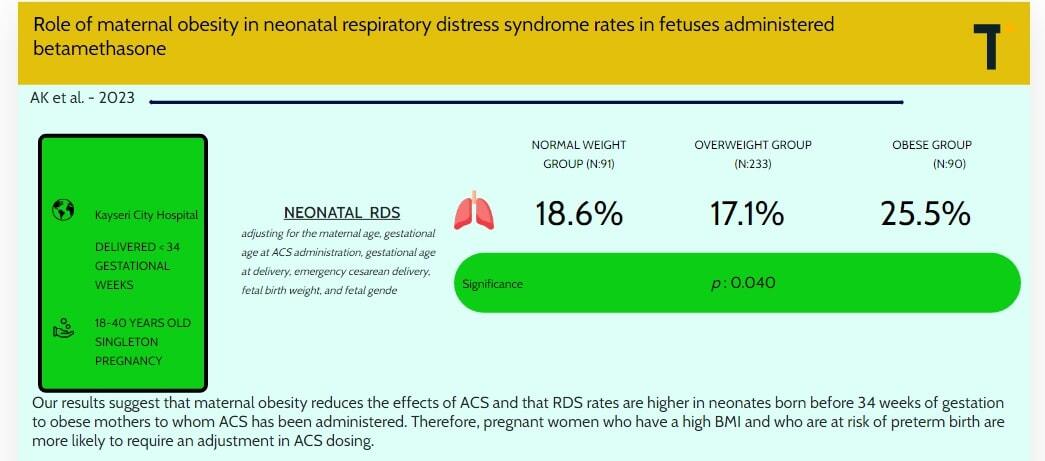Current issue
Archive
Manuscripts accepted
About the Journal
Editorial office
Editorial board
Section Editors
Abstracting and indexing
Subscription
Contact
Ethical standards and procedures
Most read articles
Instructions for authors
Article Processing Charge (APC)
Regulations of paying article processing charge (APC)
OBSTETRICS AND GYNAECOLOGY / RESEARCH PAPER
The interaction of maternal obesity and administered betamethasone in the development of fetal respiratory distress syndrome
1
Department of Obstetrics and Gynecology, Kayseri City Hospital, Kayseri, Turkey, Turkey
2
Department of Obstetrics and Gynecology, Erciyes University Medicine Faculty, Kayseri, Turkey., Turkey
3
Department of Neonatology, Kayseri City Hospital, Kayseri, Turkey, Turkey
Submission date: 2022-12-18
Final revision date: 2023-03-21
Acceptance date: 2023-04-09
Online publication date: 2023-05-04
Corresponding author
KEYWORDS
TOPICS
ABSTRACT
Introduction:
The current study evaluated the effect of obesity on neonatal respiratory distress syndrome (RDS) in pregnant women who were administered ACSs due to the risk of preterm birth and delivered before 34 weeks of gestation.
Material and methods:
In this retrospective study, 414 pregnant women who had a singleton pregnancy, were aged 18–40 years, and received two doses of ACS 24 h apart administered between 23+0/7 and 33+5/7 gestation weeks due to the risk of a preterm birth were included. For maximum fetal effect, those who completed the 48-hour steroid treatment and delivered before 34 weeks of gestation were divided into three groups according to BMI at ACS administration.
Results:
Gestational age at ACS administration and gestational age at delivery were similar among groups.. Neonatal RDS occurred in 17 (18.6%) newborns in the normal weight group, 40 (17.1%) newborns in the overweight group, and 23 (25.5%) newborns in the obese group. After adjusting for independent effects from maternal age, gestational age at ACS administration, gestational age at delivery, emergency cesarean delivery, fetal birth weight, and fetal gender, we found that RDS rates were significantly higher in the obese group.
Conclusions:
Our results suggest that maternal obesity reduces the effects of ACS and that RDS rates are higher in neonates born before 34 weeks of gestation to obese mothers to whom ACS has been administered.Therefore, pregnant women who have a high BMI and who are at risk of preterm birth are more likely to require an adjustment in ACS dosing.
The current study evaluated the effect of obesity on neonatal respiratory distress syndrome (RDS) in pregnant women who were administered ACSs due to the risk of preterm birth and delivered before 34 weeks of gestation.
Material and methods:
In this retrospective study, 414 pregnant women who had a singleton pregnancy, were aged 18–40 years, and received two doses of ACS 24 h apart administered between 23+0/7 and 33+5/7 gestation weeks due to the risk of a preterm birth were included. For maximum fetal effect, those who completed the 48-hour steroid treatment and delivered before 34 weeks of gestation were divided into three groups according to BMI at ACS administration.
Results:
Gestational age at ACS administration and gestational age at delivery were similar among groups.. Neonatal RDS occurred in 17 (18.6%) newborns in the normal weight group, 40 (17.1%) newborns in the overweight group, and 23 (25.5%) newborns in the obese group. After adjusting for independent effects from maternal age, gestational age at ACS administration, gestational age at delivery, emergency cesarean delivery, fetal birth weight, and fetal gender, we found that RDS rates were significantly higher in the obese group.
Conclusions:
Our results suggest that maternal obesity reduces the effects of ACS and that RDS rates are higher in neonates born before 34 weeks of gestation to obese mothers to whom ACS has been administered.Therefore, pregnant women who have a high BMI and who are at risk of preterm birth are more likely to require an adjustment in ACS dosing.
Share
RELATED ARTICLE
We process personal data collected when visiting the website. The function of obtaining information about users and their behavior is carried out by voluntarily entered information in forms and saving cookies in end devices. Data, including cookies, are used to provide services, improve the user experience and to analyze the traffic in accordance with the Privacy policy. Data are also collected and processed by Google Analytics tool (more).
You can change cookies settings in your browser. Restricted use of cookies in the browser configuration may affect some functionalities of the website.
You can change cookies settings in your browser. Restricted use of cookies in the browser configuration may affect some functionalities of the website.



